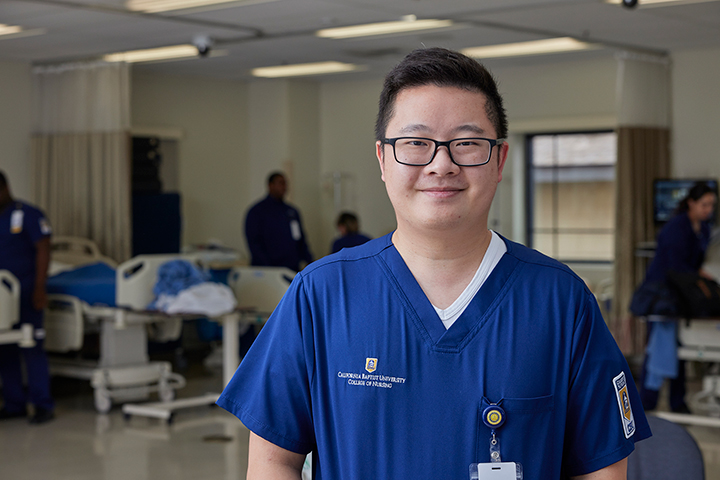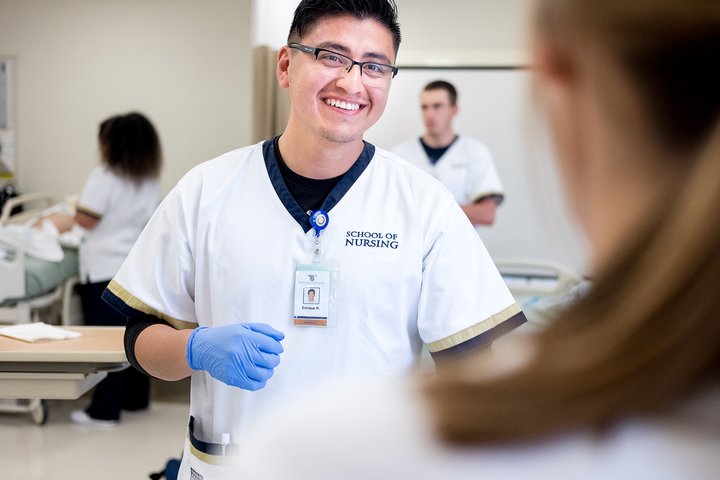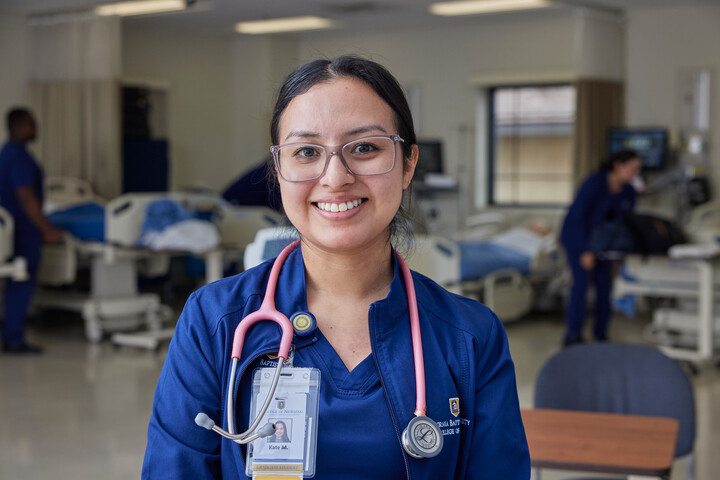Nursing, ADN to MSN
Advance your nursing career by earning your Master of Science in Nursing through California Baptist University’s ADN to MSN program. With a holistic core curriculum, six concentrations and clinical experience, you develop essential skills to take on leadership roles in the healthcare field.
Promote Health and Well-Being Through Specialized Patient-Centered Care
Created for nurses with an associate’s degree and an active California RN license, CBU’s ADN to MSN degree program empowers you to further your nursing education and leadership capabilities.
You can complete your MSN degree in 7-10 semesters. As a graduate of the ADN to MSN program, you acquire professional, advanced practice skills important to patient safety, such as assessing aggregate data, identifying areas of concern, implementing evidence-based practice to change patient outcomes and improving population health.
*7-10 semesters
*Based on current academic year. Subject to change.
Why Earn Your MSN Degree at CBU?
The master’s in nursing program at CBU builds upon your previous nursing education and experience, paving an efficient pathway to earning your graduate degree and qualifying you for advanced career opportunities. As a CCNE-accredited program, our ADN to MSN degree solidifies your foundational healthcare knowledge and allows you to align your degree with your professional goals.
Part-Time or Online Format to Allow Flexibility
Designed for working nurses, the ADN to MSN program integrates evidence-based practice with traditional coursework to improve patient outcomes. Students can choose between two formats: online with in-person residencies throughout the program or on campus and in person one afternoon/evening a week. The program allows students to pursue their graduate education while still maintaining a healthy work-life balance.
Opt to Specialize Your MSN Degree
During your time in the program, you and your cohort complete the same core courses. Then you can choose one of six specialty concentrations to deepen your expertise. Each track aligns with nationally recognized guidelines and competencies, preparing you for certification in your specialty.
Train in State-of-the-Art Facilities
For additional experiential learning, you have access to CBU's state-of-the-art Clinical Simulation Lab and Resource Center. Equipped with low- and high-fidelity simulation equipment, human-computer interaction programs and advanced practice task trainers, the simulation lab creates an immersive environment for advanced skills development.
What You'll Learn
As a graduate of the ADN to MSN program, you prepare to:
- Analyze theory-guided practice grounded in a biblical worldview.
- Evaluate the effectiveness of clinical prevention interventions that affect individual and population health outcomes.
- Integrate evidence-based practice to improve patient outcomes.
- Use information technology to interpret data and optimize patient outcomes, communication and coordination of care.
- Demonstrate professional, competent and responsible master's-level nursing.
- Display effective leadership to reduce health disparities across the continuum of care.
Program Details
To complete the ADN to MSN program, you must earn 53 to 76 units. Required units vary depending on your chosen concentration. Delivered at a part-time pace, the program’s duration ranges from seven to 10 semesters.
ADN to MSN program requirements include:
- ADN to MSN transitional courses (15 units)
- MSN core requirements (21-28 units)
- Concentration courses (16-33 units)
To help you tailor your graduate education to your personal and professional interests, we offer six MSN concentrations that help you cultivate a unique set of skills and expertise.
Adult Gerontology Acute Care Nurse Practitioner
The adult gerontology acute care nurse practitioner (AGACNP) concentration equips you to care for adults and geriatric patients in various clinical settings. As an AGACNP, you treat acute, subacute and complex patients, ensuring they receive quality care.
Family Nurse Practitioner
The family nurse specialization gives a comprehensive overview of the contemporary family structure and function, preparing you to offer primary care at any level in the healthcare industry.
Nurse Educator
The nurse educator track empowers you to develop your pedagogical skills, including curriculum design, instructional strategies, educational assessment and more.
Nursing Informatics
The nursing informatics concentration allows you to discover the critical role health information technology plays in the nursing profession. During your studies, you learn to design, plan and analyze health information technology systems to improve the quality of care.
Nursing Organizational Leadership
The nursing organizational leadership concentration equips you with the competencies needed to manage clinical outcomes and care environments. The concentration’s objectives align with the American Organization for Nursing Leadership’s standards for nurse leaders and nurse managers to prepare you for certification.
Psychiatric Mental Health Nurse Practitioner
The psychiatric mental health nurse practitioner concentration prepares you to serve individuals, families and populations who have been or are at risk of developing psychiatric disorders or mental health problems.
NUR 503: Theoretical Foundations and Role Transition for the ADN
Created for the associate degree nurse transitioning to professional nursing, this course offers an analysis of the paradigms, theories, concepts and values of the nursing discipline.
NUR 525: Research and Writing for the ADN
This course provides an introduction and overview of nursing research and writing for the associate degree nurse (ADN). The class discusses the development of nursing research and its utilization in the nursing practice.
NUR 542: Christian Leadership for the ADN
This course is designed for the associate degree nurse (ADN) transitioning to leadership as a professional master’s-prepared nurse.
What Is the ADN to MSN Program Format?
The program is offered in two formats: online with in-person residencies throughout the program or on campus and in person one afternoon/evening a week.
How Many Students Do You Accept Per Year?
MSN cohorts do not have a limit on the number of accepted students; however, most cohorts consist of 30 students.
When Can I Apply for Certification?
Graduate students are eligible to apply for certification after successful completion of:
- MSN coursework in their chosen concentration.
- Required clinical hours.
- Any other criteria (such as work experience) deemed necessary by the appropriate certificate agency.

Jeffrey Gage, Ph.D.
Professor of Nursing
Office Phone: 951-552-8658
E-mail: jgage@calbaptist.edu
Office Location: Nursing Annex 286

Rebecca Meyer, Ph.D.
Professor of Nursing
Director, Nurse Educator Program; Director Nurse Faculty Loan Program
Office Phone: 951-343-4952
E-mail: rmeyer@calbaptist.edu
Office Location: Nursing Annex 274
To be considered eligible for the ADN to MSN degree program, applicants must submit the following materials:
- Application with a $45 application fee
- An associate’s degree in nursing (ADN) from an accredited institution recognized by the U.S. Department of Education and/or the Council for Higher Education Accreditation or the evaluated equivalency
- An active, unencumbered California Registered Nursing (RN) license
- Résumé includes current practice with a minimum of one year of work experience as an RN for advanced practice RN concentrations (nurse practitioner)
- Required clearances
- A minimum 3.0 GPA for admission
Review complete application requirements.
| Application Deadlines | Fall | Spring |
|---|---|---|
| Priority | May 15 | November 1 |
| Standard | August 1 | December 1 |
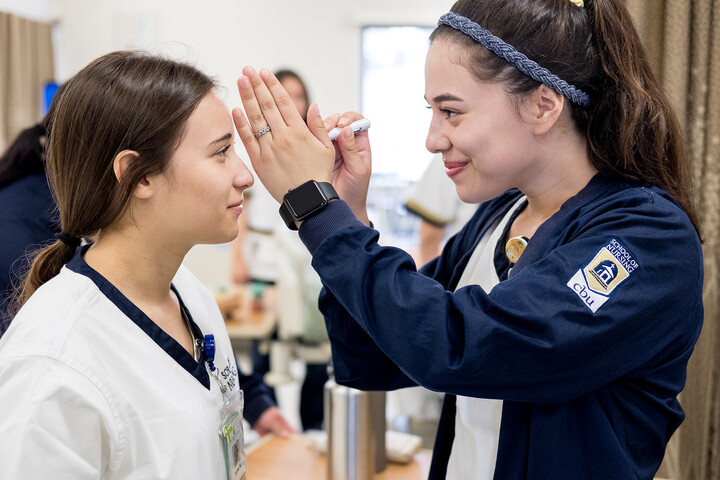
Student Opportunities: Clinical Rotations
All MSN specialty courses require clinical practicum hours as mandated by the California Board of Registered Nursing (BRN). The CBU College of Nursing meets or exceeds all clinical hour requirements. To ensure students receive a variety of clinical experiences, rotations will take place at various hospitals, health care facilities and the community, as assigned.
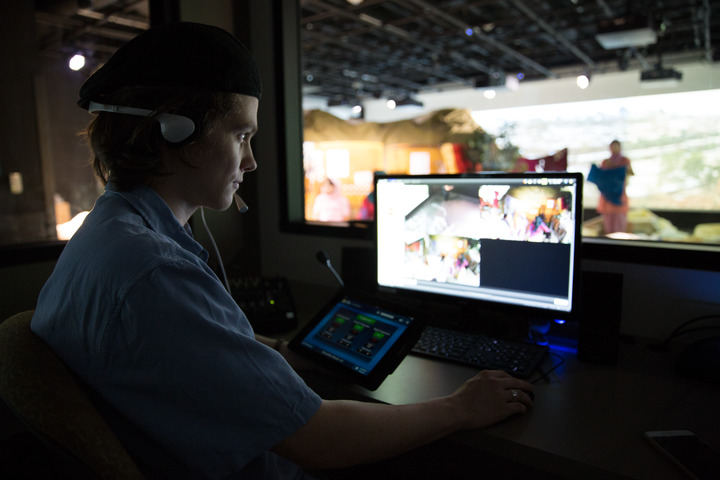
Student Opportunities: Clinical Simulation Lab
For additional experiential learning, students also enjoy access to CBU's state-of-the-art Clinical Simulation Lab and Resource Center. These rooms are equipped with low fidelity and high fidelity simulation equipment, human-computer interaction programs, and advanced practice task trainers for customized learning.
Career Outlook for MSN Program Graduates
Pursuing advanced education can yield favorable results in your career. The U.S. Bureau of Labor Statistics estimates a six percent increase in employment rates for registered nurses over the coming decade, resulting in an estimated 203,200 new job openings each year.
Healthcare facilities need competent nurses in leadership roles to ensure patients receive quality care and the nursing teams are cared for and can work efficiently. Earning your MSN degree equips you with the essential training and professional development needed to take on advanced positions, such as a nursing director or nursing manager, and increase your earning potential. As reported by PayScale, MSN-educated nurses in these positions earn average salaries of $111,896 and $100,999, respectively.
Related Programs
Discover CBU’s ADN to MSN Degree Program
With your MSN degree from California Baptist University, you undergo intensive, graduate-level training to enhance your nursing expertise, strengthen your clinical and communication competencies and expand your career opportunities. Pursue your healthcare calling and continue developing your God-given skills. Request more information or apply today!

